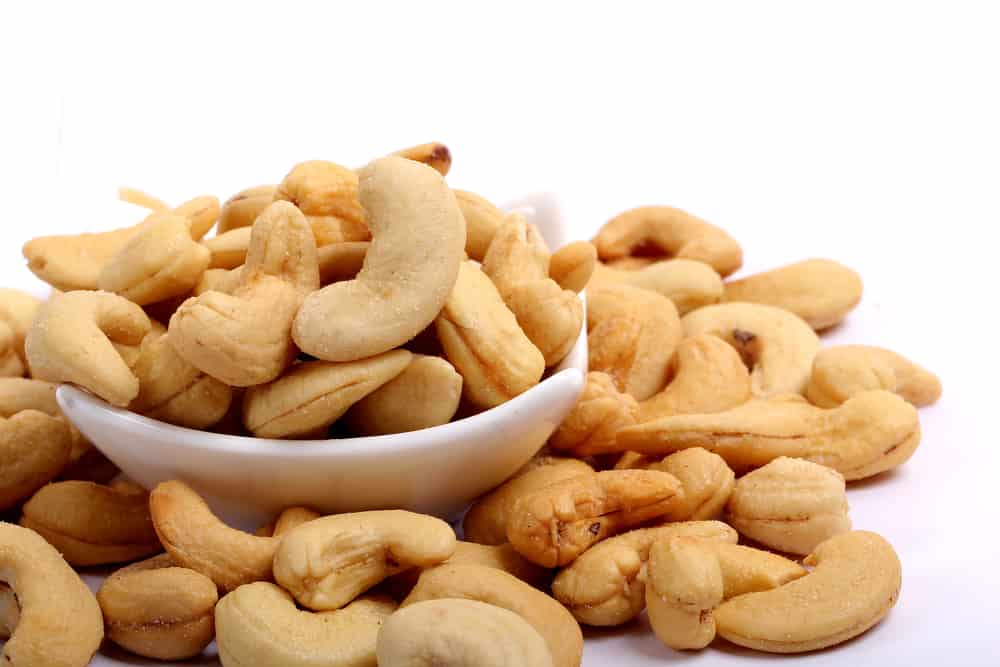
There’s a lot of debate about which form of cashew is better for you: raw, unsalted cashews, or roasted cashews? And unlike many situations in life, the good news here is that everybody wins; They’re both good for you. If you want to get into extremely granular detail, raw, unsalted cashews might slightly edge out their roasted counterpart, but only if you’re truly splitting hairs or if you have extremely strict dietary needs and preferences.
So, what can delicious unsalted cashews offer us? And what’s the difference between raw and roasted cashews? We’ll explore all the delicious details below.
When it comes to nutrition, both raw cashews and roasted cashews are excellent choices; the ways that the two types of cashews are processed do not change the other nutritional properties of the cashews. Both types are rich in nutrients, and both have the potential to be low in sugar, depending on how they are roasted. Both roasted and raw, unsalted cashews contain antioxidants. Studies have shown that both types of cashews can promote good heart health and the creation of good (HDL) cholesterol. Both types reduce the risk of gallstones. Magnesium is found in both types of cashews, and the magnesium helps promote good bone health.
The phrase “raw cashew” is misleading, as all cashews fit for consumption have been roasted once at the processing facility where they go from harvested to consumable. Because of the harmful oil that exists in the cashew’s shell, truly raw cashews must be roasted in order to remove both the cashew shell and the shell’s harmful oils. When we talk about roasted cashews, these are cashews that have been roasted a second time to alter or enhance the cashews’ flavor.
No matter how you consume cashews, you’re going to get a delicious, healthy snack. But, there are a few differences that are worth mentioning when it comes to roasted cashews and raw, unsalted cashews.
One of the biggest differences between raw cashews and roasted cashews is the flavor. Raw cashews have a mild, buttery flavor that makes them a more versatile ingredient than roasted cashews. Some people prefer to use roasted cashews when they want the cashew flavor to really pop. The roasting process enhances cashew flavor, and this way, the cashew flavor isn’t at risk of being overpowered by other flavors.
Because the cashew roasting process brings out the natural oils (and sometimes adds oils to the cashews, depending on the process), this makes the shelf life of roasted cashews less than the shelf life of raw cashews. While old, roasted cashews won’t be bad for your health if you consume them, the oil on roasted cashews can eventually turn rancid, which will result in off flavors and odors.
While both raw, unsalted cashews and roasted cashews boast a wide variety of minerals and nutrients to benefit your body, there are some ever-so-slightly nutritional differences in each processing method. Raw cashews contain slightly more iron and selenium than roasted cashews do. Roasted cashews contain higher concentrations of antioxidants, which combat the effects of free radicals in the body.
This is one of the biggest differences between raw, unsalted cashews and roasted cashews. When you purchase roasted cashews, typically, these have been roasted with additional oil, salt, and sometimes other seasonings. All of these things can add calories and up the sodium content of roasted cashews. If you are on a restrictive diet or need to closely monitor your consumption of salt or other seasonings, raw cashews would be a good choice for you. You can also roast your own cashews at home to your dietary needs or preferences.
Beyond the Nut proudly offers healthy, delicious, and ethically sourced cashews in the raw, unsalted, and roasted. No matter which type of cashew you choose, you’re getting fair trade, organic, GMO-free cashews sourced and processed in Benin. Our unique supply chain directly benefits the communities in which our cashews are grown and processed, which means you can enjoy delicious cashews with a clean conscience.
Fuel Your Beyond with the Latest Discounts, Promotions, and Product Announcements
Free shipping on all U.S. orders over $25! Dismiss